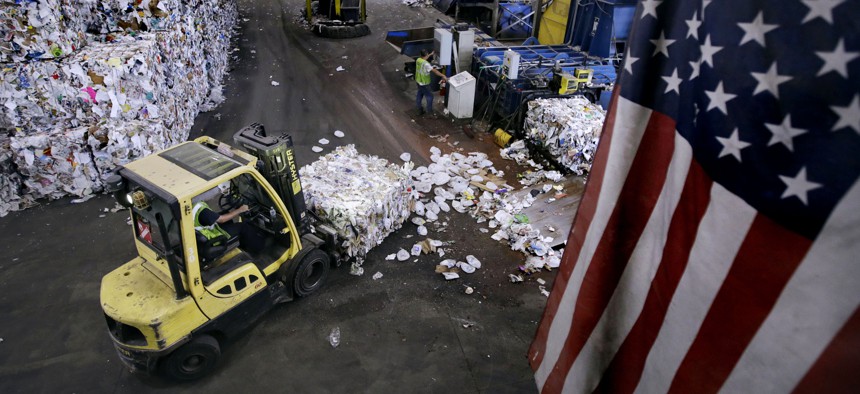Congressional Proposals Would Pay For Recycling Education at Local Level

In this Thursday, Sept. 6, 2018, photo, a forklift takes a bundle of paper and cardboard off a conveyor belt at the end of a separating machine at EL Harvey & Sons, a waste and recycling company, in Westborough, Mass. AP Photo/Charles Krupa
Two new bills would provide funding for state and local governments to better educate consumers about what can and cannot be recycled in an effort to reduce waste.
American municipalities have struggled to figure out what to do with their trash since China stopped accepting most foreign recyclables, including plastics and paper, in 2017.
Once a major importer of foreign waste, China said it no longer wanted to deal with recyclables that were contaminated and difficult to sort.
If new recycling markets are to fill the void, America’s waste will have to be better sorted. That’s why waste disposal industry associations are backing congressional legislation that would provide funding for local governments to improve their recycling infrastructure and educate Americans about local recycling programs.
The RECYCLE Act introduced in the U.S. Senate late last month would create a $15 million federal grant program overseen by the Environmental Protection Agency. Through the program, states, local and tribal governments and nonprofits could apply for grant funding that would pay for programs that educate consumers about recycling in an effort to decrease contamination, and potentially make America’s waste more marketable both domestically and in other foreign markets. Under the bill, the EPA would also be required to develop a recycling toolkit that could be used by local governments to improve their recycling rates and decrease contamination in their recycling collections.
The RECOVER ACT introduced in the U.S. House of Representatives last month would provide $500 million in matching federal grants to states, local and tribal governments to invest in improving their recycling infrastructure, programs, and education efforts.
The recycling rate in the United States was 35% in 2017, according to the EPA. But since the Chinese restrictions took effect, some communities have been unable to maintain recycling programs—with recyclables instead burned or sent to landfills. Recent news reports indicate that as much as one-third of items placed in recycling bins actually end up in landfills.
While foreign markets, including in India and Vietnam, along with domestic companies in the United States, may be able to absorb some of the waste no longer accepted by China, the quality of the materials needs to be drastically improved, said Brandon Wright, spokesman for the National Waste and Recycling Association.
“These facilities need better, cleaner recyclables,” he said. “The emphasis is on a cleaner product, less contamination in the recycling stream.”
The more education available to consumers, the more likely it is they will prevent items that could contaminate the recycling stream from ending up in the big blue bins—lithium batteries, plastic grocery bags and Christmas lights to name a few, Wright said.
His association has backed the RECYCLE Act as a means to better inform consumers about what items can be recycled and what items are aspirational at best. Recycling programs are run locally and therefore local officials are the best authorities to disseminate information about what their recycling programs can and cannot handle, Wright said.
Others were also supportive of congressional efforts to improve consumer education on the matter.
Steve Alexander, president and CEO of the Association of Plastic Recyclers, said the legislation would increase the amount of material available for recycling “by ensuring more good material enters the stream.”
Praising the matching grants that would be offered through the RECOVER Act, Michael Greenberg, the president of the Solid Waste Association of North America, said locally run recycling programs would receive a significant financial boost through the program.
“The financial support presented in this legislation is essential to building a reenergized recycling infrastructure and programs to meet stricter quality standards for recycling materials,” Greenberg said in a statement.
Andrea Noble is a staff correspondent with Route Fifty.
NEXT STORY: A Local Government Makes It Illegal to ‘Annoy’ Police





